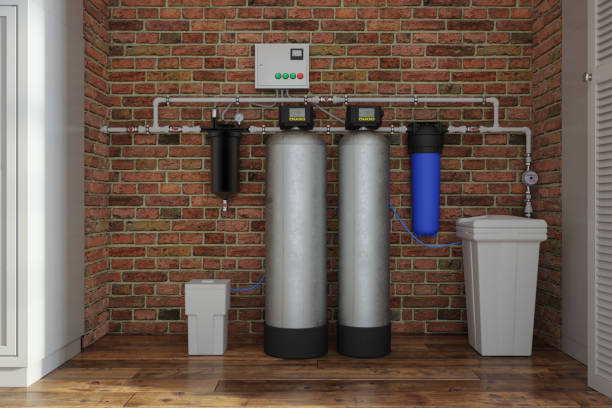Clean water is a basic need for every household, and it’s essential that the water you use for drinking, bathing, and cleaning is free from harmful contaminants. If you’ve been considering improving your water quality, a whole house water filter could be the solution. In this guide, we’ll explore why a whole house water filter is important, how it works, and some actionable tips and advice to help you make an informed decision, especially if you have well water.
Why Should You Consider a Whole House Water Filter?
The water that enters your home goes through various pipes and can be exposed to contaminants. Even if your local water supply is treated, it’s possible for pollutants to creep in through old pipes, or other environmental factors can affect the quality. This is where whole house water filters come in.
A whole house water filter is designed to purify the water coming into your home before it reaches any faucet, shower, or appliance. These systems are installed at the point where water enters your home, providing clean water to every tap, from the kitchen sink to the shower and even your washing machine.
For households with well water, whole house water filtration is particularly important. Well water can often contain higher levels of bacteria, sediments, and minerals that can affect taste and safety. A good well water filtration system can help ensure that your water is safe to use and consume.
How Does a Whole House Water Filter Work?
The primary job of a whole house water filter is to remove impurities from the water supply. Depending on the system and the filters used, it can eliminate chlorine, heavy metals, sediments, bacteria, and even unpleasant odors.
Sediment Filtration: A sediment filter is usually the first stage, designed to capture larger particles like dirt, rust, and sand. This prevents these particles from clogging pipes and damaging appliances.
Carbon Filtration: Next, a carbon filter may be used to absorb chlorine and other chemicals, improving the taste and odor of your water.
Water Softening: In areas with hard water (which is common in well water), a water softener can be included to remove calcium and magnesium. This helps reduce scale buildup in pipes and appliances and can improve skin and hair health.
UV Filtration: If you’re concerned about bacteria, viruses, and other microorganisms in well water, a UV filter can help kill harmful pathogens, ensuring that your water is microbiologically safe.
Key Benefits of a Whole House Water Filter
There are many reasons why investing in a whole house water filter can be beneficial. Here are some of the key advantages:
Improved Health: By removing contaminants like chlorine, heavy metals, and bacteria, a whole house water filter helps protect your family’s health.
Better Tasting Water: With impurities like chlorine and sulfur removed, your water will taste and smell fresher, making it more enjoyable to drink and cook with.
Longer Lasting Appliances: Filters can protect your plumbing and appliances, like dishwashers and water heaters, from damage caused by hard water or mineral buildup.
Convenience: Unlike pitcher filters or faucet filters, a whole house water filter purifies all the water coming into your home, saving you time and effort in filtering water for daily use.
What to Look for in a Whole House Water Filter System
When choosing a whole house water filter, there are several factors to consider to make sure you get the right system for your home:
Water Quality: Test your water to understand what contaminants are present. If you have well water, a water testing kit can help you determine the levels of minerals, bacteria, and other impurities in your water. This will guide you in selecting the right type of filtration system, such as a reverse osmosis system or a carbon filter.
Flow Rate: A whole house water filter needs to handle the flow of water your home uses. Ensure the system you choose can meet your household’s demand, so you don’t experience a drop in water pressure.
Filter Lifespan: Check how long the filters last and how often they need to be replaced. Some systems require more frequent maintenance, while others can go for longer periods before needing a change.
Type of System: Consider the different types of filtration systems available. A multi-stage filter system is highly effective in treating a wide range of contaminants, while some systems focus on specific issues like water hardness or bacteria.
Installation and Maintenance: It’s important to think about the installation process. Some systems are easier to install and maintain, while others may require professional help. Choose a system that fits your skills if you’re considering a DIY installation.
Tips for Maintaining Your Whole House Water Filter
Once you’ve chosen the right whole house water filter system, here are some maintenance tips to keep it working at its best:
Regular Filter Changes: Follow the manufacturer’s guidelines for changing the filters regularly. If your system uses a carbon filter, it may need to be replaced every 6 to 12 months.
Keep Track of Water Usage: If you have a high water usage household, you may need to replace the filters more frequently. Keep an eye on the filter’s performance and replace it when you notice any reduction in water quality or pressure.
Flush the System: Periodically flush the system to clear out any built-up sediment or contaminants that may affect performance.
Professional Checkups: Consider having a professional plumber inspect your system once a year to ensure everything is functioning properly, especially if you have well water.
Well Water Filtration Systems: A Special Consideration
If you’re using well water, there are a few extra steps you can take to ensure the water is safe for your family. Well water filtration systems should be equipped with the proper filters to address specific contaminants commonly found in well water, such as:
Iron and Manganese: These minerals can cause stains and have an unpleasant taste. A special filter designed for iron removal can be beneficial.
Bacteria and Viruses: A UV filtration system can be installed to kill harmful microorganisms in well water, ensuring it is safe to drink and use.
Final Thoughts on Whole House Water Filters
A whole house water filter is a smart investment for any home, particularly if you’re relying on well water. By removing harmful contaminants and improving water quality, you can protect your family’s health, prolong the life of your appliances, and enjoy better-tasting water every day. Remember to choose the right system based on your water quality, usage needs, and maintenance preferences. With the right system in place, you’ll enjoy cleaner, safer water for years to come.





More Stories
How to Prepare for Plastic Surgery in Mission Viejo: A Step-by-Step Guide
Finding the Right Plastic Surgeon in Orange CA: What You Need to Know
Is Your Relationship Stuck? A Guide to Choosing the Best Marriage Intensives in Colorado